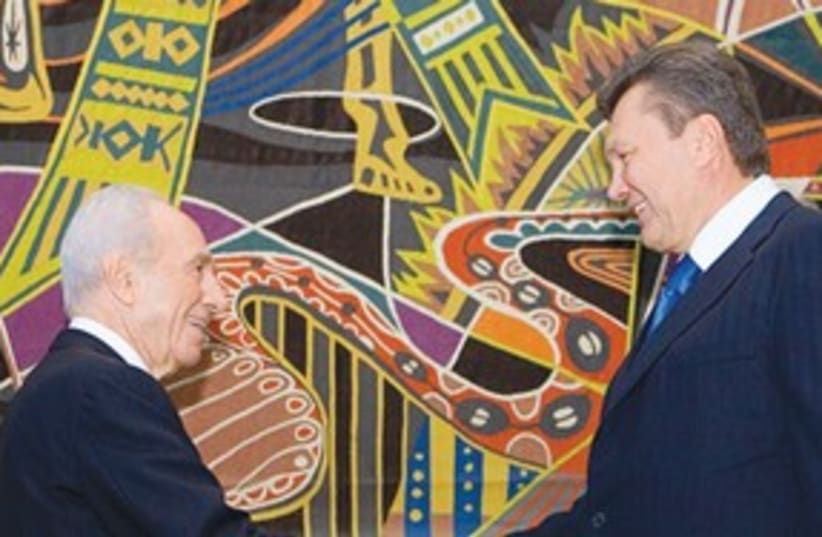Many of them have relatives and friends in your country. Tell us about the political direction Ukraine is following, and what life is like for the people. Also, an area of concern among Ukrainian Israelis is the payment of pensions earned during their working years in Ukraine. What can you tell us about that?First of all, the presence of such a large community of emigrants from Ukraine in Israel will be one more factor stimulating the development of Ukrainian-Israeli ties in all spheres – political, economic and cultural.I take this opportunity to reiterate Ukraine’s willingness to deepen the broad ties with our fellow countrymen. We think of Ukrainian expats as an important link, a “live bridge” connecting Ukraine and Israel, creating the atmosphere of a common home.In order to resolve the issue of payment of pensions to citizens of Ukraine who reside in Israel, Ukraine and Israel are holding ministerial negotiations on an agreement. This will provide the legal and procedural basis of payment of pensions to those citizens of Ukraine who have moved to live in Israel.Our relevant authorities are currently considering a draft law and a draft ministerial regulation on the issue. When these documents are adopted, citizens of Ukraine who have reached retirement age and who have made their permanent homes in countries with which Ukraine does not have an international agreement on the issue, will be able to receive a pension guaranteed them by the law of Ukraine.During your presidency, relations between Kiev and Moscow have become increasingly normalized. This is prompting some concerns in Ukraine that the country is coming under growing Russian influence. How do you answer such claims?I am doing everything possible to build fruitful and mutually beneficial relations, based on universal norms and principles of international law as well as on the Big Treaty of friendship and cooperation between Ukraine and Russia. This has been underlined, in particular, during my visits and meetings with [Russian President] Dmitry Medvedev this year.Consultations have also been held by heads of parliaments, ministries and other institutions of our two states.We pay special attention to economic cooperation and the implementation of joint economic projects. All this will give additional impetus to economic growth in our two states and, as a result, improve the well-being of our citizens. I doubt much that such a policy could cause any objection or any apprehension.The gas question was one of the critical issues of the recent past. Winter is at hand, and Ukrainian citizens are worried again. Is there any possibility that the situation will again become aggravated, that Moscow will threaten to “close the valve”?Do you know the difference between “recent past” and today’s situation? Now we can listen and understand each other.We negotiate with our partners on changing gas prices, conditions of its supply and transit. The era of commercial wars has passed.
'Expats ‘living bridge’ between Ukraine, Israel'
Ukraine president welcomes ties between countries; as Shimon Peres makes state visit, Viktor Yanukovych urges deepened cooperation in hi-tech innovation too.

Many of them have relatives and friends in your country. Tell us about the political direction Ukraine is following, and what life is like for the people. Also, an area of concern among Ukrainian Israelis is the payment of pensions earned during their working years in Ukraine. What can you tell us about that?First of all, the presence of such a large community of emigrants from Ukraine in Israel will be one more factor stimulating the development of Ukrainian-Israeli ties in all spheres – political, economic and cultural.I take this opportunity to reiterate Ukraine’s willingness to deepen the broad ties with our fellow countrymen. We think of Ukrainian expats as an important link, a “live bridge” connecting Ukraine and Israel, creating the atmosphere of a common home.In order to resolve the issue of payment of pensions to citizens of Ukraine who reside in Israel, Ukraine and Israel are holding ministerial negotiations on an agreement. This will provide the legal and procedural basis of payment of pensions to those citizens of Ukraine who have moved to live in Israel.Our relevant authorities are currently considering a draft law and a draft ministerial regulation on the issue. When these documents are adopted, citizens of Ukraine who have reached retirement age and who have made their permanent homes in countries with which Ukraine does not have an international agreement on the issue, will be able to receive a pension guaranteed them by the law of Ukraine.During your presidency, relations between Kiev and Moscow have become increasingly normalized. This is prompting some concerns in Ukraine that the country is coming under growing Russian influence. How do you answer such claims?I am doing everything possible to build fruitful and mutually beneficial relations, based on universal norms and principles of international law as well as on the Big Treaty of friendship and cooperation between Ukraine and Russia. This has been underlined, in particular, during my visits and meetings with [Russian President] Dmitry Medvedev this year.Consultations have also been held by heads of parliaments, ministries and other institutions of our two states.We pay special attention to economic cooperation and the implementation of joint economic projects. All this will give additional impetus to economic growth in our two states and, as a result, improve the well-being of our citizens. I doubt much that such a policy could cause any objection or any apprehension.The gas question was one of the critical issues of the recent past. Winter is at hand, and Ukrainian citizens are worried again. Is there any possibility that the situation will again become aggravated, that Moscow will threaten to “close the valve”?Do you know the difference between “recent past” and today’s situation? Now we can listen and understand each other.We negotiate with our partners on changing gas prices, conditions of its supply and transit. The era of commercial wars has passed.